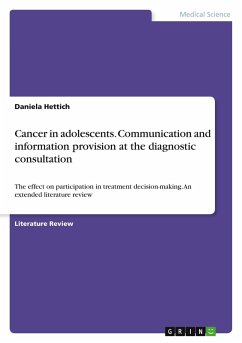Literature Review from the year 2018 in the subject Health - Public Health, grade: Distinction, The Open University, course: Postgraduate Certificate in Integrated Practice in Childhood and Youth, language: English, abstract: The purpose of this literature review is to examine the following question: How do communication and information provision of the cancer diagnosis affect the adolescents' participation in treatment decision-making? To find evidence to answer this question, a literature search was conducted using the databases available to me through the Open University library. It was found that despite the recognition of the importance of adequate information provision, adolescent cancer patients and their caregivers feel that they are not adequately informed by physicians who use regulated communication to control information provision. For cancer survivors, insufficient information provision at diagnosis has left them with knowledge gaps in their medical history. For the newly diagnosed patient inadequate information provision limits their understanding of the illness, weakening their ability to participate in their treatment decision-making. Parental culture and the involvement of the adolescent in decision-making in the family unit prior to illness affect how decision-making is approached in the oncological setting. In the triadic decision-making constellation, parents act as barriers to adolescent involvement by shielding their children from negative findings and taking over responsibility in decision-making. The nature of the illness, treatment protocols and organizational constraints further constrain adolescents' activity in decision-making. Whilst adolescents want to be informed, their participatory behaviour is varied ranging from being present during consultation to autonomous decision-making. The main implication for health-care professionals is that the best interests of the adolescent are served if their information and participation preferences are sought prior to the first consultation upon which, ideally, a more collaborative and tailored approach could be applied. In furtherance to this, research on adolescent information preferences and full disclosure at diagnosis should be conducted, as presently the emphasis is still on containment and protectionism.
Hinweis: Dieser Artikel kann nur an eine deutsche Lieferadresse ausgeliefert werden.
Hinweis: Dieser Artikel kann nur an eine deutsche Lieferadresse ausgeliefert werden.








